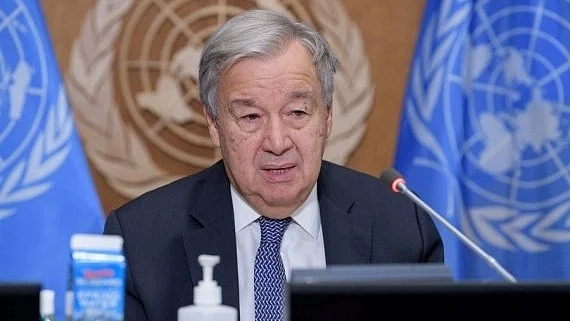Key emitters absent as attendees demand fossil fuel phase out at UN Climate Ambition Summit
Guterres' "no-nonsense summit" on Wednesday came at a time when the world is reeling under the devastating impacts of climate change and probably the hottest year on record

United Nations Secretary-General Antonio Guterres' Climate Ambition Summit highlighted two key aspects: the conspicuous absence of leaders from major emitter nations and a unanimous call for phasing out fossil fuels by attending leaders.
Guterres' "no-nonsense summit" on Wednesday came at a time when the world is reeling under the devastating impacts of climate change and probably the hottest year on record.
However, leaders from some of the world's largest polluting nations, the US and China, were conspicuously absent from the summit Guterres called to reinvigorate efforts to combat the climate crisis.
Notable omissions also included leaders from the UK, Japan, France and India.
Among the top carbon emitters, only the European Union received an invitation.
Ahead of the summit, Antonio Guterres had unveiled his Acceleration Agenda, saying only 'movers' and 'doers' would be allowed to attend.
In a significant shift from the 2019 UN Climate Action Summit, this gathering saw nearly every head of state emphasising the necessity of phasing out fossil fuels.
Prominent figures like EU Commission President Ursula von der Leyen, German Chancellor Olaf Scholz, Chilean President Gabriel Boric, Tuvalu Prime Minister Kausea Natano, and Republic of Marshall Islands President David Kabua all stressed the urgency of this transition.
Canadian Prime Minister Justin Trudeau faced questions about his country's recent expansion of oil production.
He responded by committing to introduce oil and gas emissions cap regulations by year-end and exceeding Canada's current methane reduction target of 75 per cent by 2030.
Key issues such as tripling of global renewable energy capacity and phasing out fossil fuels are expected to take centre stage at COP28 in Dubai.
Several leaders, including those from Chile and Colombia, criticised the fossil fuel industry's influence on national and multilateral policies, accusing them of sowing denial and delay.
Leaders present at the summit outlined comprehensive actions across their economies, from promoting renewables to electrifying transportation, regulating methane emissions, eliminating fossil fuel subsidies and investing in adaptation.
Barbados Prime Minister Mia Mottley, an advocate for reforming international financial institutions through the Bridgetown Agenda, called on more leaders to take concrete steps in reforming multilateral development banks and the role of finance and insurance companies in climate action.
She urged the world to address the climate crisis with the same urgency as the conflict in Ukraine and said that borrowing money to respond to climate loss and damage was almost a crime against humanity.
Kenyan President William Ruto proposed a universal fossil fuel tax to fund resilience, adaptation and transition efforts.
Oliver Bate, CEO of Allianz, emphasised the urgency of phasing out coal and significantly reducing oil and gas use.
In a passionate address, Californian Governor Gavin Newsom declared the climate crisis as a fossil fuel crisis and criticised the oil industry's manipulation.
"This climate crisis is a fossil fuel crisis... It's not complicated. It's the burning of oil. It's the burning of gas. It's the burning of coal. And we need to call that out. For decades, the oil industry has been playing each and every one of us in this room for fools," he said.
Follow us on: Facebook, Twitter, Google News, Instagram
Join our official telegram channel (@nationalherald) and stay updated with the latest headlines